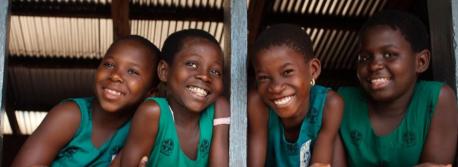
UNICEF in Ghana
Together with partners, UNICEF is working to give every child in Ghana a fair chance in life.
Hands-on experience in communities across Ghana provides UNICEF with the expertise to work with the government and civil society partners to protect and promote the rights of the country's poorest citizens.
The aim is to create a positive cycle through which the next generation of children can break free of poverty and participate fully in Ghana’s growing economy.
Program priorities have included:
- reaching adolescent girls and young women with information on sexual harassment in school, the prevention of child marriage and early pregnancy, and menstrual hygiene management to keep girls enrolled in school
- improving access to clean water, sanitation and hygiene — including providing latrines and helping to end the practice of open defecation
- strengthening social protection programs to assist vulnerable families in urban areas
UNICEF supports Ghana’s government through service delivery, technical assistance, policy advocacy, capacity-building and analysis in the areas of nutrition, health care, immunization, education, child protection and water, sanitation and hygiene (WASH). Learn more.
UNICEF works with partners to protect children's rights and provide the assistance and services they need to survive and thrive. Support UNICEF. Donate today.